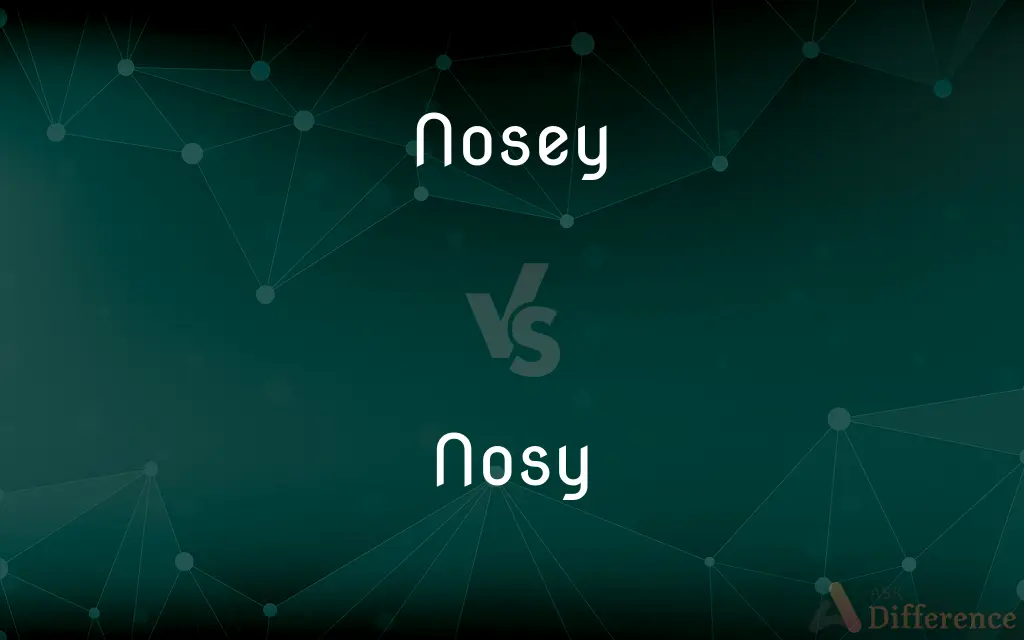Nosey vs. Nosy — What's the Difference?
By Tayyaba Rehman — Updated on November 6, 2023
Nosey and nosy both mean overly curious, but "nosey" is an alternative spelling, less common than "nosy."

Difference Between Nosey and Nosy
Table of Contents
ADVERTISEMENT
Key Differences
Nosey and nosy are two variants of the same adjective that describe someone who is overly inquisitive about other people's affairs. "Nosey" tends to be the less commonly used form, although it is understood in the same way as "nosy." It connotes a person who has a tendency to poke their metaphorical 'nose' into others' business.
While "nosy" is the more standard spelling in American and British English, "nosey" can occasionally be seen in British English texts. Both words evoke the image of someone prying into matters that don't concern them, often leading to irritation or intrusion of privacy.
In literature and media, characters described as nosey or nosy are typically those who are overly interested in the protagonist’s or others' personal matters. Regardless of the spelling, the implications for the character's personality are identical. These individuals are often portrayed as gossipers or meddlers.
The choice between "nosey" and "nosy" may come down to personal preference or regional dialect. In writing, it is essential to be consistent with the spelling you choose. Despite the slight variation in their lettering, both words are pronounced the same way and carry the same social stigma when describing someone's unwanted curiosity.
Comparison Chart
Spelling
Alternative spelling, less common.
More common spelling.
ADVERTISEMENT
Usage
More frequently seen in British English.
Preferred in both American and British English.
Dictionary Entries
May not be listed in all dictionaries.
Typically listed as the primary entry in dictionaries.
Online Presence
Less common in online publications.
More prevalent in online texts and publications.
Etymology
Same etymology, different evolution in spelling.
Regarded as the etymologically standard form.
Compare with Definitions
Nosey
Inquisitive
The nosey neighbor peeked over the fence to see the commotion.
Nosy
Overly inquisitive
The nosy shopper kept asking about the other customers' purchases.
Nosey
Prying
The nosey reporter wouldn’t stop asking about the celebrity's divorce.
Nosy
Curious to a fault
The nosy child rummaged through the gifts before his birthday.
Nosey
Meddlesome
A nosey aunt always asks about my love life.
Nosy
Interfering
My nosy brother always needs to know what I'm up to.
Nosey
Snoopy
Her nosey habits got her into trouble when she stumbled upon a secret.
Nosy
Investigative
He was nosy about the closed-door meeting at work.
Nosey
Variant of nosy.
Nosy
Eavesdropping
The nosy neighbor listened through the wall with a glass.
Nosey
Alternative spelling of nosy
Nosy
Given to or showing an intrusive curiosity about the affairs of others; prying.
Nosey
Alternative spelling of nosy
Nosy
Prying, inquisitive or curious in other’s affairs; tending to snoop or meddle.
They built tall fences, yet the nosy neighbors always seemed to know everything about them.
Nosey
Alternative spelling of nosy
Nosy
Having a large or elongated nose.
Nosey
Offensively or intrusively curious; prying; nosy; as, a nosy neighbor.
Nosy
A look at something to satisfy one's curiosity.
I might wander down to the construction site for a nosy at what they're building.
Nosey
Offensively curious or inquisitive;
Curious about the neighbor's doings
He flipped through my letters in his nosy way
Prying eyes
The snoopy neighbor watched us all day
Nosy
Offensively or intrusively curious; prying; nosey; as, he flipped through my letters in his nosy way.
Nosey
Intrusive
I left the party early to avoid my nosey coworkers.
Nosy
Offensively curious or inquisitive;
Curious about the neighbor's doings
He flipped through my letters in his nosy way
Prying eyes
The snoopy neighbor watched us all day
Common Curiosities
Is "nosey" a correct spelling?
Yes, "nosey" is a correct, albeit less common, spelling of the word.
Can "nosey" and "nosy" be used interchangeably?
Yes, they can be used interchangeably but consistency in spelling should be maintained within a document.
Is "nosey" more commonly used in British English?
"Nosy" is the more common spelling, but "nosey" is also acceptable in British English.
Which is the preferred American English spelling?
"Nosy" is the preferred spelling in American English.
Are there any differences in pronunciation?
/ˈnoʊzi/.
Will using "nosey" instead of "nosy" be considered a spelling mistake?
In American English, "nosey" may be marked as a less standard variant.
Is "nosy" considered informal language?
Yes, "nosy" is informal and typically used in casual conversation.
Are "nosey" and "nosy" adjectives?
Yes, both are adjectives.
What is a synonym for "nosey/nosy"?
"Inquisitive" can be a less negative synonym.
Can "nosey" be found in English dictionaries?
Some dictionaries list "nosey" as a variant spelling of "nosy."
How can I remember which spelling to use?
If you're in the U.S., stick with "nosy" to match the standard spelling.
What is the noun form of "nosey/nosy"?
The noun form is "nosiness."
Does the meaning change with the spelling?
No, the meaning does not change with the spelling.
Is it offensive to call someone nosey or nosy?
It can be seen as negative, implying undue curiosity in others' affairs.
How do I stop being nosey/nosy?
Focus on your own business and respect others' privacy.
Share Your Discovery

Previous Comparison
Competent vs. Proficient
Next Comparison
Weigh vs. WeightAuthor Spotlight
Written by
Tayyaba RehmanTayyaba Rehman is a distinguished writer, currently serving as a primary contributor to askdifference.com. As a researcher in semantics and etymology, Tayyaba's passion for the complexity of languages and their distinctions has found a perfect home on the platform. Tayyaba delves into the intricacies of language, distinguishing between commonly confused words and phrases, thereby providing clarity for readers worldwide.














































